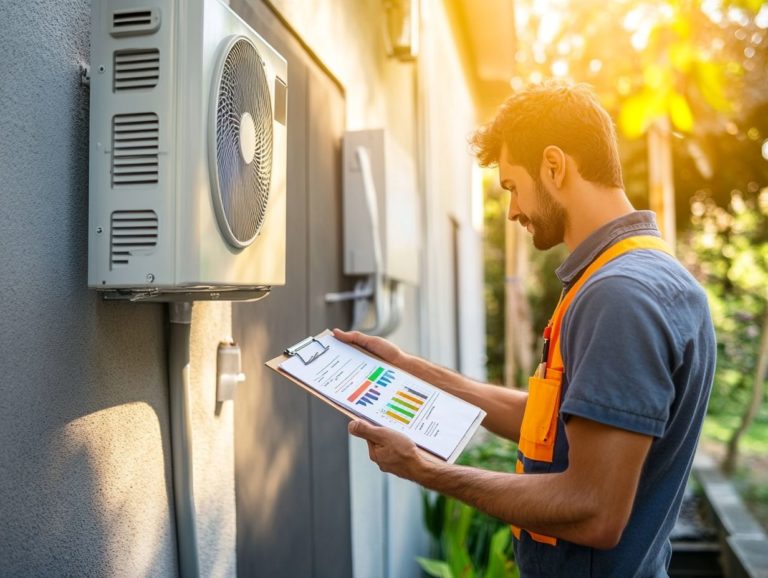How to Prepare for a Commercial Energy Audit
In today s landscape, improving energy efficiency is more than just a trend; it s an essential strategy for businesses intent on reducing costs and championing sustainability.
A commercial energy audit emerges as a vital instrument in this endeavor. It guides organizations to pinpoint energy-saving opportunities and elevate overall performance.
This guide explains the purpose and benefits of a commercial energy audit, detailing what you can expect throughout the process and how to implement effective energy efficiency measures.
Whether you re gearing up for an audit or aiming to sustain your energy savings, you will acquire the insights necessary to make well-informed decisions for your business.
Contents
- Key Takeaways:
- What is a Commercial Energy Audit?
- Explanation and Purpose
- Benefits of a Commercial Energy Audit
- Preparing for a Commercial Energy Audit
- The Energy Audit Process
- Implementing Energy Efficiency Measures
- Monitoring and Maintaining Energy Efficiency
- Frequently Asked Questions
- 1. What is a commercial energy audit?
- 2. Why is it important to prepare for a commercial energy audit?
- 3. How can I prepare for a commercial energy audit?
- 4. What should I expect during a commercial energy audit?
- 5. How long does a commercial energy audit usually take?
- 6. What can I expect after a commercial energy audit?
- Next Steps
Key Takeaways:

A commercial energy audit can help businesses save money and reduce their environmental impact by identifying energy inefficiencies. Before an energy audit, gather necessary information and identify areas of concern to ensure a thorough and effective assessment. Implementing energy efficiency measures and regularly monitoring and maintaining them can lead to sustained savings and long-term benefits for businesses.
What is a Commercial Energy Audit?
A commercial energy audit serves as a thorough evaluation designed to assess your building’s energy systems and uncover opportunities for enhancing energy efficiency. This process involves a meticulous analysis of energy consumption patterns, HVAC systems (Heating, Ventilation, and Air Conditioning), lighting efficiency, and insulation levels. The culmination is a detailed energy consumption profile.
By leveraging insights from the energy audit report, you can craft a strategic energy management plan that not only reduces operational costs but also elevates your building’s overall performance.
Explanation and Purpose
The essence and purpose of a commercial energy audit rest in its capacity to uncover energy-saving opportunities and elevate energy efficiency across commercial buildings.
By meticulously evaluating energy usage patterns, an audit reveals areas where energy is being wasted often without your awareness enabling you to make informed decisions.
The incorporation of advanced energy monitoring systems provides you with real-time data, allowing you to track consumption effectively. These insights pave the way for a comprehensive energy management strategy that not only targets immediate savings but also aligns with your long-term sustainability goals.
Pinpointing inefficiencies and implementing tailored measures can lead to substantial cost reductions and a reduced carbon footprint, enhancing both your bottom line and environmental impact.
Benefits of a Commercial Energy Audit
A commercial energy audit can save you money and help the environment. By identifying areas of energy waste, it enables you to reduce greenhouse gas emissions, contributing to a more sustainable future while enhancing your bottom line.
Cost Savings and Environmental Impact
The cost savings from a commercial energy audit can significantly reduce your energy and operational expenses, enabling you to allocate your funds more effectively.
By pinpointing inefficiencies in your lighting, heating, and cooling systems, these audits reveal specific energy-saving opportunities, such as upgrading to LED lighting or installing programmable thermostats.
Implementing these changes not only leads to lower utility bills but also enhances the overall comfort and productivity of your workspace.
Embracing these energy-efficient practices positively impacts the environment by decreasing carbon footprints and ensuring compliance with energy performance standards.
This dual benefit highlights the importance of sustainability in your business operations. Don t wait! Start saving money and protecting the environment today.
Preparing for a Commercial Energy Audit

Preparing for a commercial energy audit requires you to collect essential information regarding your energy consumption patterns, the various building systems in place, and pinpointing areas of concern that could lead to energy waste, all of which are covered in the process of auditing commercial buildings.
This proactive approach will set the stage for a thorough and effective audit, ensuring that every detail is accounted for in the pursuit of greater efficiency.
Key Preparation Steps:
- Gather information on energy consumption patterns.
- List the various building systems in place.
- Identify areas of concern that could lead to energy waste.
Schedule your commercial energy audit now to kickstart your energy-saving journey!
Gathering Necessary Information
Gathering the necessary information for a commercial energy audit requires you, as a facility manager, to compile energy usage data.
This data helps identify operational disruptions that may impact energy systems.
Start by collecting historical energy usage data; it s the key to understanding your consumption trends.
Your operational schedules are crucial for pinpointing peak usage times and identifying potential areas for improvement.
Understanding how building automation systems work helps you find inefficiencies or opportunities for optimization.
This detailed data collection clarifies current energy trends and highlights potential operational interruptions that could distort the audit results.
Ultimately, this fosters a more effective and informed energy management strategy tailored to your needs.
Identifying Areas of Concern
Identifying areas of concern during a commercial energy audit requires a keen analysis of your energy systems.
A thorough assessment of preventive maintenance processes can uncover inefficiencies.
Among the most prevalent issues are outdated heating, ventilation, and air conditioning (HVAC) systems, which can lead to excessive energy consumption and skyrocketing operational costs.
Inadequate insulation can result in temperature fluctuations, negatively affecting both comfort and energy efficiency.
By implementing the energy audit recommendations, you can upgrade your HVAC systems and enhance insulation.
These improvements not only boost overall energy performance but also foster a healthier work environment.
Investing in these solutions can yield significant savings on energy bills while promoting sustainability, positioning you as a forward-thinking leader in today s conscientious business landscape.
The Energy Audit Process
The energy audit process is a meticulous journey employing various methodologies, from cutting-edge energy modeling software to strict adherence to energy audit certification standards.
This comprehensive approach culminates in an actionable energy audit report tailored to your needs.
Steps and Procedures
The energy audit process begins with a thorough initial energy efficiency assessment.
This lays the groundwork for implementing energy monitoring systems that gather real-time data.
This crucial first step allows you to dive deeper into your facility’s operations and energy consumption patterns.
Once data collection is in full swing, analyze this information, paying close attention to peak usage times, inefficiencies, and any anomalies that could pinpoint areas ripe for improvement.
With this analysis in hand, formulate recommendations for equipment upgrades or behavioral changes.
Ultimately, cultivate a more energy-conscious environment.
By identifying specific capital improvement opportunities for energy efficiency, optimize your energy use, reduce costs, and contribute meaningfully to sustainability goals.
Implementing Energy Efficiency Measures

Implementing energy efficiency measures is essential for fully capitalizing on the advantages of a commercial energy audit.
Transforming the audit recommendations into practical, energy-efficient models positions you to achieve significant gains in performance and savings.
Recommendations and Strategies
The recommendations and strategies stemming from a commercial energy audit should seamlessly align with your energy savings goals and performance standards, like the ANSI/ASHRAE Standard 100, which provides guidelines for energy efficiency.
Consider adopting energy management systems that enable continuous monitoring of your consumption, allowing you to make informed adjustments based on real-time data.
Regular training sessions for your employees can cultivate a culture of energy awareness, embedding habits that effectively reduce waste.
Additionally, leveraging benchmarking tools helps you compare your energy performance against industry averages, pinpointing areas ripe for improvement while ensuring compliance with relevant energy codes and regulations.
Take the first step today towards a more energy-efficient future!
Monitoring and Maintaining Energy Efficiency
Monitoring and maintaining energy efficiency is essential for ensuring that the enhancements made during a commercial energy audit lead to lasting savings and improved building energy performance. By actively overseeing these metrics, you can maximize the benefits of your investment and contribute to a more sustainable future.
Best Practices for Sustained Savings
Prioritizing best practices is crucial for achieving sustained savings in energy efficiency. Implement preventive maintenance processes and embrace advanced energy audit technologies to ensure optimal performance.
Routine checks of your heating, ventilation, and air conditioning (HVAC) systems are vital. Regular checks boost your equipment’s lifespan and efficiency! These checks make sure your systems run at peak performance.
Regularly changing filters and calibrating settings can lead to a significant reduction in energy waste. Continuous monitoring of energy consumption through smart metering systems enables you to identify trends and anomalies, allowing you to adjust usage patterns as needed.
Educating your staff about energy-saving practices fosters a culture of efficiency, ensuring that everyone contributes to maintaining reduced consumption. By prioritizing these strategies, you significantly enhance your organization s energy performance.
Frequently Asked Questions
1. What is a commercial energy audit?

A commercial energy audit is a thorough assessment of a business or commercial property’s energy usage and efficiency. It involves inspecting energy systems, identifying areas of energy waste, and making recommendations for improvements to reduce energy consumption and costs.
2. Why is it important to prepare for a commercial energy audit?
Preparing for a commercial energy audit allows you to gather information and data on your energy usage and systems beforehand. This will help the auditor identify problem areas more efficiently and provide more accurate recommendations, especially if you refer to preparing your home for an energy audit.
3. How can I prepare for a commercial energy audit?
To prepare for a commercial energy audit, start by collecting utility bills, maintenance records, and any other relevant information about your energy systems. Conduct your own energy audit by walking through your property and noting any areas of concern or energy waste.
4. What should I expect during a commercial energy audit?
During a commercial energy audit, the auditor will gather information about your energy usage, inspect your energy systems and equipment, and identify any areas of energy waste. They may also conduct tests, such as thermal imaging, to detect areas of heat or energy loss.
5. How long does a commercial energy audit usually take?
The duration of a commercial energy audit can vary depending on the size of the property and the complexity of the energy systems. On average, an audit can take anywhere from a few hours to a full day.
6. What can I expect after a commercial energy audit?
After a commercial energy audit, you will receive a detailed report outlining the auditor’s findings and recommendations for improving energy efficiency. It may also include estimated costs and potential savings for implementing the suggested measures. You can use this report to make informed decisions on how to reduce your energy usage and costs.
Next Steps
Act now to reduce your energy costs and enhance your building s efficiency! Consider implementing the recommendations from your audit and fostering a culture of energy awareness within your organization.






